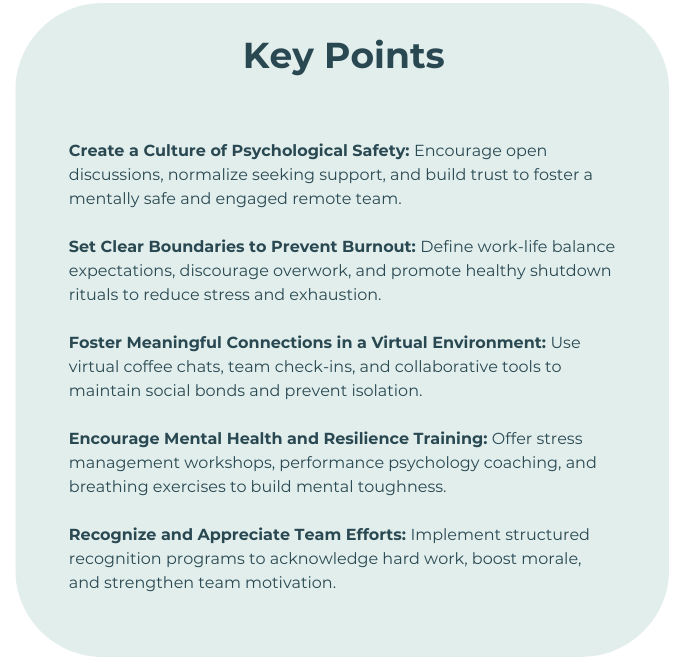Boosting Psychological Well-Being in Remote Teams: Strategies for Resilient Leaders
What to Consider When Reading
How does psychological safety impact engagement and creativity in remote teams?
What leadership practices can prevent burnout and improve team well-being in virtual work settings?
"Great teams aren’t built in an office; they’re built on trust, communication, and a culture of well-being—no matter where they work."
With remote work becoming the new norm, leaders face a critical challenge: How do you keep your team mentally strong, connected, and engaged from a distance? Without in-person interactions, team members may feel isolated, unmotivated, or overwhelmed. The result? Increased stress, burnout, and reduced performance.
At The Mental Game Clinic, we specialize in performance psychology for teams, executives, and professionals, helping them build resilience, mental well-being, and high-performance habits. This blog explores how leaders can foster psychological well-being in remote teams and create a thriving, mentally strong work culture.
The Psychological Challenges of Remote Work
Isolation and Loneliness – Without social interactions, employees may feel disconnected, leading to lower motivation and mental fatigue.
Work-Life Blur – The lack of separation between work and home life can increase stress, overwork, and burnout.
Communication Gaps – Without regular face-to-face interactions, misunderstandings, lack of feedback, and unclear expectations can create frustration.
Reduced Team Cohesion – A lack of spontaneous conversations can weaken trust and team synergy.
How Leaders Can Foster Psychological Well-Being in Remote Teams
1. Create a Culture of Psychological Safety
Psychological safety means employees feel safe expressing their thoughts, asking for help, and taking risks without fear of criticism. When people feel heard and valued, engagement and innovation increase.
Encourage open discussions about challenges and mental well-being.
Normalize asking for support—leaders who are vulnerable build trust.
Exercise: Start meetings with a quick check-in question (e.g., “How are you feeling today on a scale of 1-10?”).
2. Set Clear Boundaries to Prevent Burnout
Remote workers often feel pressured to be “always on”, leading to exhaustion. Leaders must set clear expectations around work-life balance.
Encourage “tech-free” hours and no-meeting blocks.
Lead by example—log off at reasonable hours and don’t send late-night emails.
Exercise: Implement a “shutdown ritual”—a small end-of-day habit like journaling or stretching to signal work is over.
3. Foster Meaningful Connections
Remote work can feel isolating, but leaders can build social connection intentionally.
Schedule virtual coffee chats or “watercooler” hangouts.
Use collaborative tools (Slack, MS Teams) to encourage informal conversations.
Exercise: Run a gratitude exercise—ask team members to share one thing they appreciate about a colleague each week.
4. Encourage Mental Health and Resilience Training
Resilient teams handle stress better, recover from setbacks faster, and stay motivated. Investing in mental skills training can significantly boost performance.
Offer mental resilience workshops (meditation, stress management, emotional intelligence).
Provide access to performance psychology coaching.
Exercise: Teach box breathing (inhale 4 sec, hold 4 sec, exhale 4 sec, hold 4 sec) to manage stress before meetings.
5. Recognize and Appreciate Team Efforts
Employees who feel valued and appreciated are more engaged and resilient. Recognition fuels motivation.
Acknowledge hard work publicly in team meetings.
Implement a “Wins of the Week” shout-out in Slack or email.
Exercise: Start meetings by asking “What’s one thing you’re proud of this week?”
Meet Our Expert: Jayati Singh
At The Mental Game Clinic, Jayati Singh, a performance psychotherapist specializing in team resilience and leadership coaching, helps organizations reduce stress, build engagement, and optimize mental performance. His work focuses on helping remote teams stay connected, motivated, and mentally strong.
Stronger Minds, Stronger Teams
Remote work doesn’t have to mean disconnected teams. Leaders who prioritize mental well-being create resilient, motivated, and engaged employees—leading to better performance, creativity, and job satisfaction.
Want to take your remote team’s performance to the next level? Work with our experts at The Mental Game Clinic to build a thriving, high-performance team.
References
Edmondson, A. (1999). Psychological safety and learning behavior in work teams. Administrative Science Quarterly, 44(2), 350-383. https://doi.org/10.2307/2666999
Sonnentag, S., & Fritz, C. (2015). Recovery from job stress: The stressor-detachment model as an integrative framework. Journal of Organizational Behavior, 36(S1), S72-S103.
Google’s Project Aristotle (2016). Re:Work Study on High-Performing Teams. https://rework.withgoogle.com/

